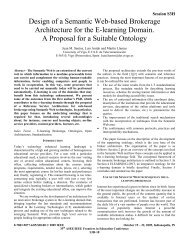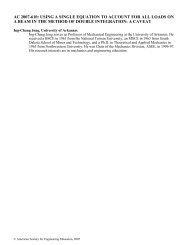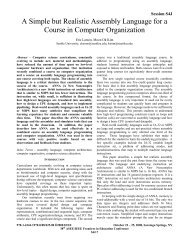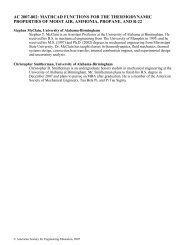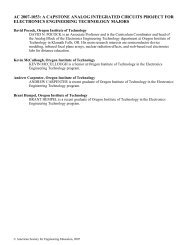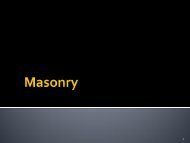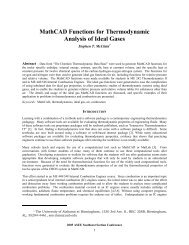AC 2007-514: UNIVERSITY OF ARKANSAS SCIENCE ...
AC 2007-514: UNIVERSITY OF ARKANSAS SCIENCE ...
AC 2007-514: UNIVERSITY OF ARKANSAS SCIENCE ...
Create successful ePaper yourself
Turn your PDF publications into a flip-book with our unique Google optimized e-Paper software.
• A discussion of the experiment, possible alterations and the problems/limitations<br />
for use in their classrooms<br />
• Discussion of how the experiment fits into the state mandated science frameworks<br />
• Evaluation<br />
As an example, consider the production of ethanol by fermentation, the experiment of<br />
Day 6. The topic background focused on ethanol as an alternative fuel source (from sugars,<br />
corn, lignocellulosics), the yeast and its ability to grow both aerobically and anaerobically, and<br />
the planned execution of the experiment. The experiment then followed, in which the teachers<br />
compared:<br />
• anaerobic growth and production of ethanol vs. aerobic growth and,<br />
• CO2 production during ethanol production both with and without agitation.<br />
The moderator and teachers then discussed what happened and why, possible questions<br />
that the teachers might pose to students (such as why the same yeast can be used in making<br />
bread, making beer and wine, and producing energy), and experimental alternatives<br />
(fermentation of molasses or starch, the addition of nutrients, temperature effects). The<br />
integration of an experiment that lasts several hours into the classroom was also discussed, as<br />
well as how this would affect its ultimate use in their classrooms. Finally, the teachers evaluated<br />
the presentation and the experimental investigation.<br />
Program Evaluation<br />
The success of the program is being measured by performance of participating teachers<br />
and students on standardized assessment tests, and by teacher evaluation of the experiments. The<br />
teacher assessment was developed at the University of Louisville Center for Research in<br />
Mathematics and Science Teacher Development, and will be administered both at the beginning<br />
and at the end of each workshop. Students are tested each year in the spring as part of the State's<br />
required accountability testing system. We plan to use the Iowa Test of Basic Skills (ITBS) as<br />
the assessment of student performance.<br />
Results from the evaluation of the daily experiments by the participating teachers are<br />
shown in Table 2. The teachers were asked to evaluate the alignment of the activity with the<br />
Arkansas Science Curriculum Frameworks, the quality of the presenter (moderator), whether or<br />
not they would incorporate the activity into their classroom curricula, whether or not they felt<br />
like they knew whom to contact for further information, whether the resources from the<br />
experiment would be useful to them in the future, and whether the time spent on vertical<br />
alignment of the experiment into the curriculum frameworks was useful. Evaluations were<br />
obtained for each of the experiments using a 1-5 rating system, where 5 indicates that they<br />
strongly agree.<br />
Table 2. Evaluation of Daily Experiments<br />
Evaluation Statement<br />
Experiment/Evaluation<br />
1 2 3 4 5 6 7 8<br />
Lab activity is directly aligned with the<br />
Arkansas Science Curriculum Frameworks<br />
4.7 4.5 4.8 3.8 4.6 4.7 4.9 4.7



